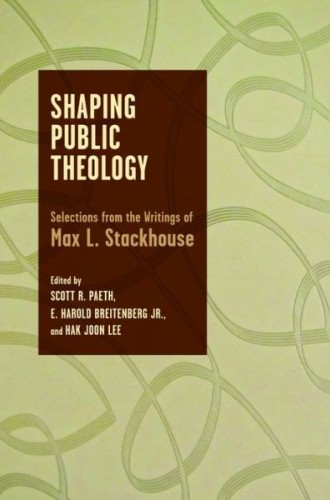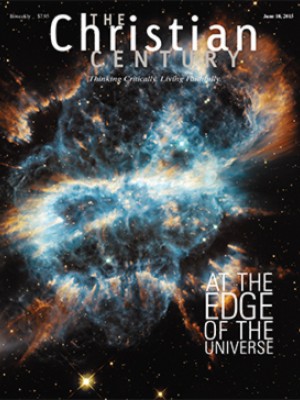Shaping Public Theology, by Max L. Stackhouse
Max Stackhouse has been an influential figure in American theology for almost half a century. He shaped generations of students at Andover Newton Theological School and Princeton Theological Seminary, and he convened groups of scholars who came to grips with the emerging issues of five tumultuous decades. The essays in this volume, drawn from across Stackhouse’s career, provide an accessible and comprehensive introduction to his thought, and they raise provocative questions about how we are constructing what Stackhouse calls public theology today.
Running through the essays is an emphasis on globalization that began early in Stackhouse’s career, as he explains in “A Christian Perspective on Human Rights.” While he was a young faculty member at Andover Newton, his church involved him in dialogues with theologians in India and East Germany. At the time, most American social ethics was narrowly focused on domestic issues of civil rights and racial equality. Stackhouse did not ignore these movements, but he saw them in a context that would transform human rights into a global issue and make economics the driving force in social development. India helped him see the complexity and diversity of social life, and the late stages of Marxism made him permanently wary of systems that define human life by any single set of economic or political concepts.
Read our latest issue or browse back issues.
This experience of complexity and plurality also resonated with his studies at Harvard under James Luther Adams, who did much to introduce the sociological perspectives of Max Weber and Ernst Troeltsch into American religious thought. According to Stackhouse, this complex global reality requires a public theology. He is always careful to say that he borrowed the phrase “public theology” from Martin Marty, but he gives it a systematic content that is distinctly his own.
Part one of this book is devoted to tracing the historical antecedents and opponents of the theological method that he develops in part two. The essay “Covenantal Justice in a Global Era” summarizes the biblical ideas that Stackhouse draws on throughout his work.
His understanding of covenant illustrates the idea that runs through his work: our moral life is not just given to us. It must be constructed in response to conditions that limit us but that also leave us free to choose. Covenantal justice has “engaged, learned from, and stabilized those aspects of justice that were already present in various cultures.” It has also “reformed, revised, deepened, and broadened” existing rules and values. This ongoing interaction between universal and particular, between permanent and immediate, should be familiar to those who see history as the story of a covenant between God and humanity.
For the general reader, the best place to begin may be with the essay “Civil Religion, Political Theology, and Public Theology: What’s the Difference?” Here Stackhouse provides a masterful survey of contemporary Christian social thought and locates his own work among the alternatives. What marks public theology is the conviction that people who are grounded in a particular religious tradition can make their values clear, even persuasive, to those who do not share their faith.
Despite today’s handwringing over the decline of religious literacy and some theologians’ insistence that the language of faith is incomprehensible to those who do not share it, Stackhouse builds on a moral awareness of the requirements of justice that is part of human life, even though it must be crafted to particular historical circumstances. Theology reforms, revises, and deepens prevailing ideas of justice, and theological truths need responsible application to the shared questions a society faces.
Moral evaluations and theological interpretations thus involve a synthesis of the general and the particular that is neither universally valid nor completely relative. What covenantal theology has learned through its own historical transformations is now relevant on a global scale. We seek the truth in ways that stabilize particular, local achievements of justice and provide leverage for expanding their geographical reach and temporal durability. That is simply how human life is lived and how human societies are structured.
A second key point about public theology is that it recognizes the variety of cultures, commitments, and institutions that shape our lives. Families, businesses, congregations, and cultural institutions all are part of who we are, and a public theology speaks to each of these in ways that respect the integrity of the rest.
What Stackhouse’s public theology rejects, then, is a political theology that supposes we can reduce social life to the accumulation of political power or change it comprehensively by gaining control of the power of the state. This may seem too conservative to those who are dissatisfied with the social institutions they have, but for Stackhouse it is a realistic warning against the kind of utopian thinking that all too often has sacrificed real people and their limited achievements to illusions of perfect justice.
All of this has global implications, but also practical relevance for the life of the church. It is not surprising that Stackhouse values the synthesis of theology and local reality that happens in every congregation. As he puts it at the end of an essay on theological education, “Pastors must be enabled not only to nurture the inner, personal, convictional side of faith, but also the outer implications of that faith as worked out by believing laity in their vocations in a now-global civil society.”
One need not agree with everything Stackhouse says to see the importance of that ministry for the church and for society today. The question for the churches is whether they still have the imagination and the resources that were available half a century ago, when they sent Max Stackhouse to Germany and India. We need a new generation of public theologians for a laity that is now even more in need of such leadership.







